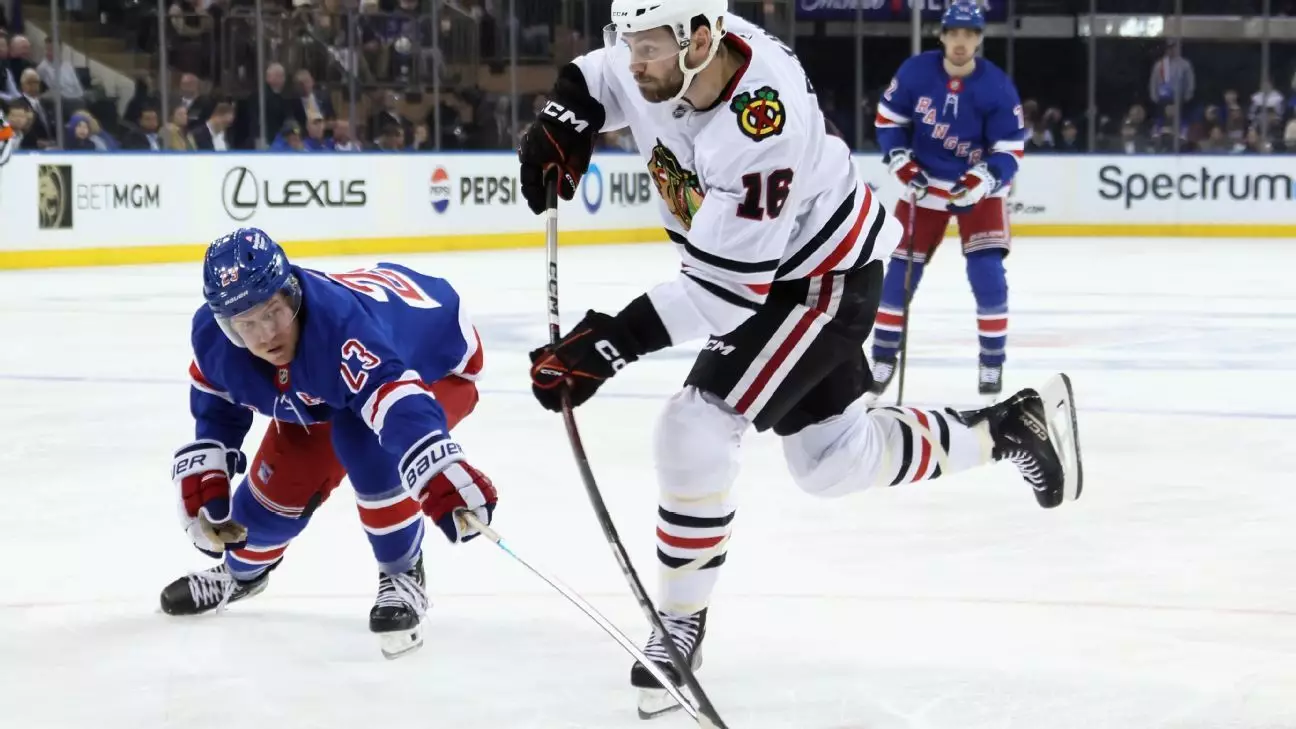The New York Rangers entered the previous NHL season as the formidable powerhouse of the league, boasting the best record and showcasing an exciting style of play. Fast forward to the present, and a stark contrast unfolds: three months into the new season, the team finds itself adrift in mediocrity, struggling with consistency and performance. With just eight victories in their last 10 assignments, the Rangers have witnessed their once-promising season morph into a series of frustrating outcomes, amplifying the noise of discontent among players and fans alike.
One of the most significant indicators of the Rangers‘ current woes is the recent trade of their captain, Jacob Trouba, to the Anaheim Ducks. His exit leaves a considerable void in both the defensive lineup and the team’s leadership dynamic. Trouba was not only a key physical presence on the ice but also a vocal leader, guiding younger players and contributing significantly to team morale. Following his trade, the Rangers have struggled to assert themselves defensively, which has become increasingly evident during their dismal streak of performances.
In a recent matchup against the Chicago Blackhawks—currently the league’s last-place team—the Rangers‘ shortcomings were glaringly obvious. The defeat, capped off by a disheartening 2-1 scoreline, was met with audible frustration from the home crowd at Madison Square Garden. When a franchise historically associated with success faces such turbulence, the palpable disappointment manifests as boos from loyal fans, a clear reflection of unmet expectations. Star forward Artemi Panarin openly acknowledged the team’s need for improvement, stressing the importance of reclaiming their standing and silencing the critical crowd.
Rangers’ head coach, Peter Laviolette, provided an insightful post-game analysis. Citing problems with execution, he hinted at potential fatigue or mental strain affecting player performance. However, Laviolette’s stance was clear: excuses would not be entertained as the team grapples with disappointing loss after disappointing loss. With the players unable to produce consistent quality hockey, Laviolette’s reviews will prove crucial as he attempts to ignite a competitive fire within the team during this challenging phase.
Another layer of the current Rangers narrative is the performance of their star goaltender, Igor Shesterkin. Despite a hefty contract extension worth $92 million, his current record of 9-10-1, accompanied by a troubling trend of six losses in his last seven outings, has raised eyebrows. Fans and analysts alike eagerly await a return to form, understanding that a team’s success is intricately linked to the performance of its goaltender. Shesterkin’s struggles compound the team’s defensive challenges and ultimately hinder their chances of reclaiming upper-tier status.
With Trouba’s departure stripping the roster of its prior leadership framework, players such as the seasoned Chris Kreider must now shoulder the burden of providing direction. Kreider’s acknowledgment of the need for a shift in mindset emphasizes the importance of resilience and collective effort in overcoming impasses. An effective outcome will stem from players rallying together, committing to improved performances, and showcasing an optimistic spirit as they face competitors in upcoming matches.
Looking forward, the Rangers have pivotal games ahead, beginning with a challenging encounter against the Buffalo Sabres, followed swiftly by a clash with the Los Angeles Kings. These matchups stand as critical opportunities for the team to break their disappointing cycle. The collective aim remains clear: restore pride in their performance, regain the confidence of their fan base, and most importantly, resurrect the winning culture that once defined the franchise. Whether they can rise to the occasion and adapt to their evolving landscape remains to be seen, yet anticipation continues to build as the season unravels further.


Napsat komentář